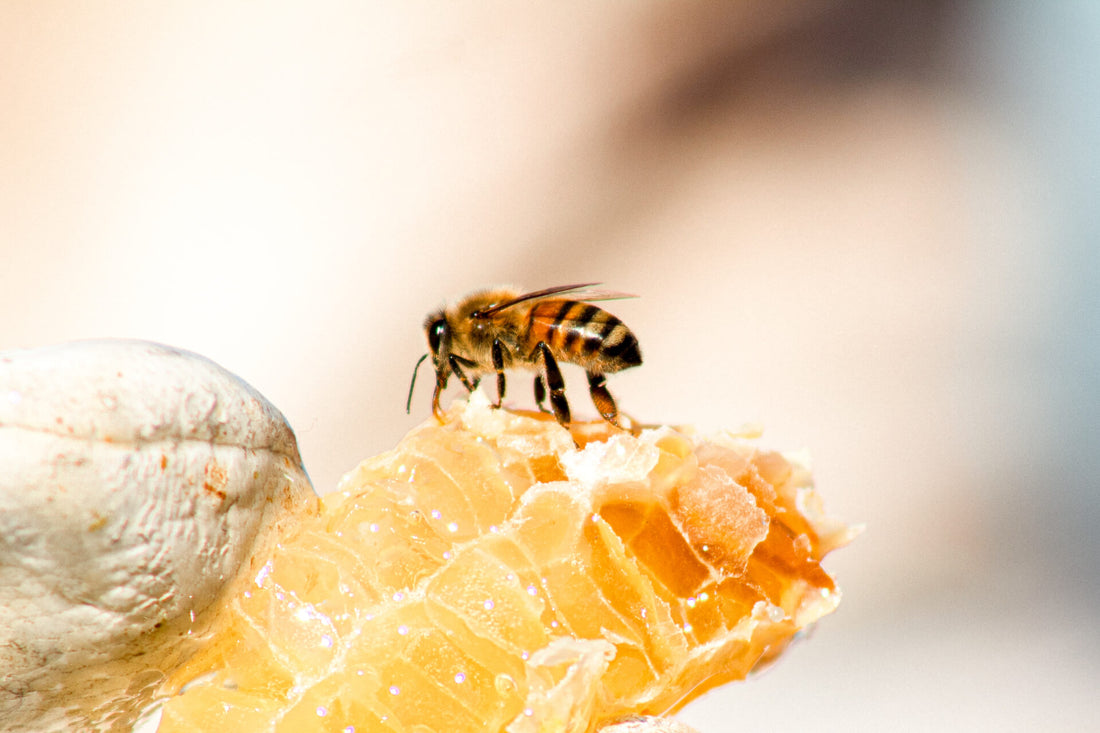When you think of bees, you think of the honey they produce. But did you know that feeding tired bees honey can kill them?
One of our top FAQs is if you can feed honey to bees instead of sugar water, so we are buzzing to write a blog about it!
Harmful Honey
The Bumblebee Conservation warns that you should never feed a tired bee honey. Honey can contain fatal pathogens that spread diseases such as American Foulbrood, European Foulbrood and the Sacbrood Virus.
American Foulbrood (AFB) is a bacterial disease that causes the bacterium Paenibacillus larvae to multiply, which kills the bees at pre-pupal or pupal stages.
AFB is incurable as its spores are resistant to high and freezing temperatures and can stay dominant for 50+ years. Once it's passed to a tired bee in a sample of honey, it returns to infect and ultimately kills the whole hive. Robbing bees then target this dying colony, which kills their colony and so on...
It's actually illegal to leave honey out for bees in Australia to stop this from happening!
This is why that well-meaning supermarket honey you bought is deadly to bee colonies. The same goes for sugary energy drinks, (such as Lucozade) brown sugar and sweets as bees don't have the digestive systems that we have to benefit from their sugary kick.
The Only Exception
The only exception to this 'no honey' rule is for professional beekeepers.
During winter or when nectar-producing flowers are in short supply, bees and beekeepers will store their honey in the hives as a food source. This is because they use honey from their own disease-free hives.
 Suited beekeeper examining bees from the hive.
Suited beekeeper examining bees from the hive.
The Correct Way to Save a Tired Bee
We suggest 5 simple steps to revive a bee:
- Check if the bee actually needs your help as she could be resting/sleeping, wet or already dead.
(You can find out more about how to check if the bee is tired or identify a bee with our Bee ID page.) - Use your sleeve/container to avoid getting stung or hurting her when you move her.
- Place her on a flower nearby.
- Wait patiently (no more than 30mins) and see if she takes to the flower for nectar.
- Offer a sugar solution as a temporary fix.
The RSPB states a 2 tablespoon to one tablespoon of white, granulated sugar to water ratio. Place it on a spoon and offer it to the bee. Don't force it on her if she doesn't take it!
Remember to never leave sugar water out for bees as this encourages nearby managed bees, feral colonies, and robber bees to spread diseases between their hives.
You can easily use your Bee Revival Kit if you have one too, which contains a special, beekeeping-grade sugar solution called ambrosia®, which is better than normal white sugar.
 pittielover1
pittielover1
 pittielover1.
pittielover1.
What is Ambrosia®?
Ambrosia® is a feeding syrup that has a balanced ratio of fructose, sucrose, and glucose and has the purest beet sugar in its solution to nourish bees.
It has great benefits such as:
- Preventing crystallisation of feed in honeycombs due to the high fructose concentration.
- Being as close to a natural bee's nutrition as possible.
- Increasing a bee's energy by 15%.
- Being more resistant to microbiological spoilage.
This means you can keep your keyring for longer in case of a tired bee sighting.
(We do suggest refilling after a spontaneous bee encounter though to further avoid spreading diseases between bees!)
Prevention Over Cure
As we enter the summer months, more bees can be seen on our pavements, roads and garden paths as our cities have fewer flowers to provide them with the food they need.
You can help them out by planting wildflowers in your garden. Letting your garden go wild and planting bee-friendly flowers is not only good for our fuzzy friends, but for our wellbeing as well.
We are wishing you a great summer enjoying your garden from us at Beevive!



1 comment
Thank you for another great blog full of amazing information